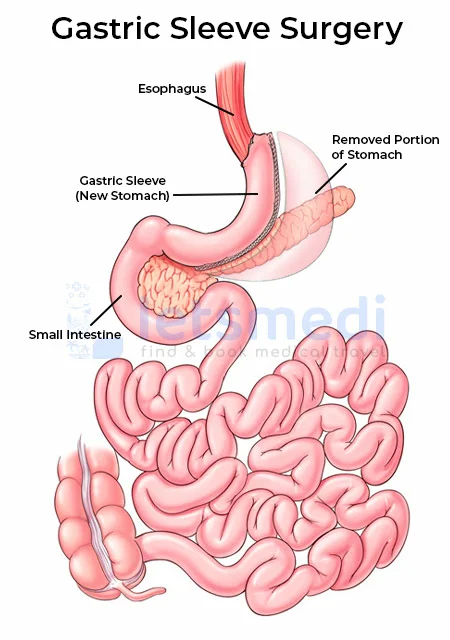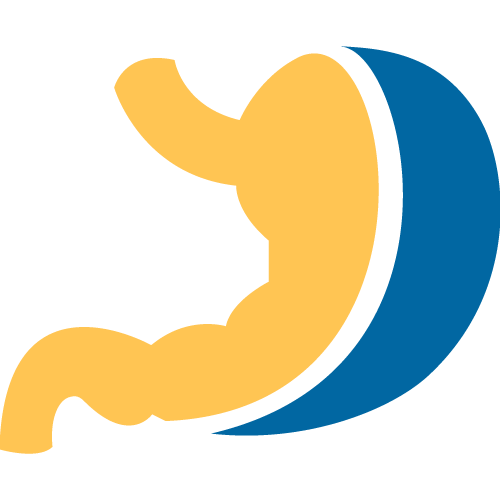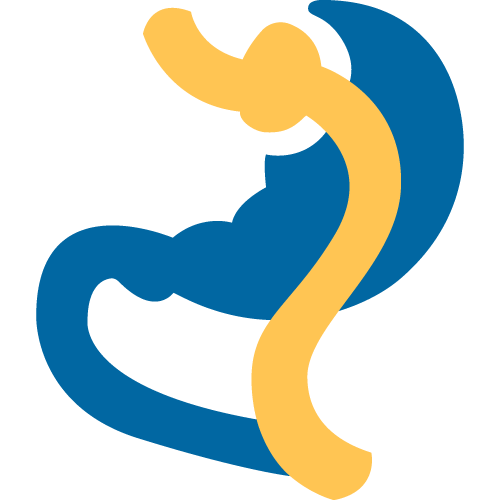Gastric Sleeve in Turkey
Gastric Sleeve Turkey; Turkey has become a prominent destination for medical tourism, particularly for bariatric surgery such as the gastric sleeve. This procedure, also known as sleeve gastrectomy, involves the removal of a significant portion of the stomach, resulting in a sleeve or tube-like structure. The surgery not only restricts the amount of food one can consume but also affects gut hormones, contributing to weight loss. Patients choose Turkey for its combination of experienced surgeons, state-of-the-art medical facilities, and cost-effectiveness compared to other countries. Moreover, the scenic beauty and historical richness of the country provide a serene environment for recovery. With a high success rate and comprehensive post-operative care, Turkey’s healthcare sector continues to draw individuals seeking a transformative journey towards better health and well-being.

Gastric Sleeve Surgery in Turkey
Gastric Sleeve Surgery in Turkey is a set of procedures crafted to encourage weight loss. This treatment is a beacon of hope for those grappling with obesity. Commonly referred to as weight loss surgery or obesity surgery, it functions by altering the digestive system’s operation.
One prevalent bariatric procedure is the Duodenal Switch. It melds stomach restriction with intestinal rerouting to catalyze weight loss and enhance health. Opting for bariatric surgery in Turkey doesn’t merely mean affordable healthcare. It also entails access to avant-garde facilities and proficient surgeons.
Each patient’s journey is distinctive, and the most suitable procedure is customized to their exclusive needs. Seek the aid you require, and set foot on your route towards a healthier future with bariatric surgery in Turkey.
Pros and Cons of Bariatric Surgery in Turkey
Bariatric surgery is often called weight loss surgery. It has several advantages and disadvantages that must be taken into account when deciding whether it is the right option.
Surgical intervention can be a powerful tool in the battle against obesity.
It can induce significant weight loss, making it a strong argument in favor. Achieving a healthier weight can improve obesity-related conditions, like diabetes, heart disease, and sleep apnea. This, in turn, can enhance patients’ overall quality of life.
Moreover, this surgery often triggers a positive psychological transformation, boosting self-esteem and life expectancy. However, the decision to undergo bariatric surgery should not be taken lightly, considering the cons. Potential surgical risks, including infections and blood clots, are part of the package.
The commitment to dietary restrictions is lifelong. Additionally, there is a risk of nutritional deficiencies due to malabsorption. This could require supplemental intake.
Understanding the pros and cons of bariatric surgery is crucial. This helps in making an informed and balanced decision.
|
Gastric Sleeve |
Gastric Bypass |
Gastric Balloon |
Gastric Band |
|
|
Turkey |
3000£ |
3750£ |
2150£ |
4000£ |
|
Mexico |
5000£ |
8000£ |
3500£ |
6500£ |
|
India |
9500£ |
12500£ |
7500£ |
9500£ |
|
Thailand |
8500£ |
11000£ |
7000£ |
7500£ |
|
Germany |
9500£ |
11000£ |
6500£ |
8000£ |
|
Canada |
10000£ |
13500£ |
7500£ |
7500£ |
|
America |
12700£ |
16000£ |
6500£ |
11000£ |

Get Information Now
Gastric Sleeve Turkey Reviews
Gastric sleeve Turkey reviews; Patients who have undergone gastric sleeve surgery in Turkey have shared positive reviews about their experiences. Many have praised the expertise of Turkish surgeons, the quality of medical facilities, and the personalized care they received throughout their treatment. The affordability of gastric sleeve surgery in Turkey has also been highlighted as a significant advantage, allowing patients to access top-tier healthcare services without breaking the bank.
Furthermore, patients have expressed satisfaction with the comprehensive support they received from healthcare providers in Turkey, including pre-operative consultations, post-operative care, and ongoing follow-up to ensure successful recovery and long-term weight management.
Gastric sleeve surgery in Turkey has garnered positive reviews from patients who have benefited from the combination of high-quality medical care, experienced healthcare professionals, and affordable treatment options. With its commitment to patient safety and satisfaction, Turkey continues to be a preferred destination for individuals seeking effective weight loss solutions through gastric sleeve surgery.

Posted on
Google
Posted on
Google
Posted on
GoogleTypes Of Bariatric Surgery in Turkey
In Turkey, various types of Bariatric Surgery are utilized as effective weight loss procedures to combat obesity. These surgical treatments are chosen based on the patient’s needs and their overall health. The most common types include Gastric Bypass Surgery and Gastric Sleeve Surgery.
Gastric Bypass Surgery, renowned for its long-term weight loss results, involves the creation of a small pouch in the stomach, bypassing a portion of the intestine.
Gastric Sleeve Surgery, on the other hand, involves the removal of a portion of the stomach, resulting in a tubular ‘sleeve.’
These are some of the robust weight loss surgery options available in Turkey, offering a new lease on life for patients battling obesity.

Get Information Now
Cost of Gastric Sleeve Surgery in Turkey
The cost of gastric sleeve surgery in Turkey can vary depending on several factors, including the hospital or clinic where the procedure is performed, the experience of the surgeon, and the specific needs of the patient. On average, the cost of gastric sleeve surgery in Turkey ranges from $3,000 to $5,000. This cost typically includes the surgeon’s fee, hospital fees, pre-operative tests, and post-operative care. It’s important to note that this cost is significantly lower than in many other countries, making Turkey an attractive option for individuals seeking affordable weight loss surgery.
When considering the cost of gastric sleeve surgery in Turkey, it’s essential to take into account the quality of care and expertise provided by Turkish healthcare professionals. Many hospitals and clinics in Turkey are equipped with state-of-the-art facilities and staffed by highly trained surgeons who specialize in bariatric procedures. Patients can expect to receive the same level of care and attention as they would in their home country, if not better, at a fraction of the cost.
Cost of gastric sleeve surgery in Turkey is significantly lower than in many other countries, making it an appealing choice for individuals seeking affordable weight loss surgery.
GASTRIC SLEEVE
Pre-Op Examinations
Sleeve Gastrectomy Weight-Loss Surgery
Medication and Diet Plan
7-8 Night Accommodation
Post-Op Support & Counselling
VIP Transportation
GASTRIC BALLOON
Endoscopic Insertion of the Balloon
6/12 Month Gastric Balloon
Diet Plan
2 Night Hotel Accommodation
Post-Op Support & Counselling
VIP Transportation
GASTRIC BYPASS
Pre-Op Examinations
Gastric Bypass Surgery
Medication and Diet Plan
7-8 Night Accommodation
Post-Op Support & Counselling
VIP Transportation
Bariatric Surgery Before and After Pictures
Bariatric Surgery Before and After in Turkey” encapsulates a transformative journey towards healthier living.
Patients considering this surgery often peruse bariatric surgery before and after photos, which display remarkable physical changes.
Beyond the evident weight loss, improved skin elasticity often marks another notable transformation.
Despite common concerns, advanced surgical techniques and proper aftercare in Turkey can significantly minimize residual skin sagging.
The visual contrast in these ‘before and after’ narratives powerfully illustrates the life-altering potential of bariatric surgery.
Bariatric Surgery Requirements
Bariatric surgery requirements refer to the specific criteria that an individual must meet to be eligible for this type of obesity surgery. These requirements are crucial in assessing the potential success and safety of the surgery for a given patient.
Generally, candidates for bariatric surgery have a Body Mass Index (BMI) at a certain threshold or a BMI at a slightly lower threshold with weight-related health conditions such as diabetes or hypertension
However, these are not the sole criteria for bariatric surgery. Other factors, such as psychological stability, a genuine understanding of the surgery’s risks and benefits, and commitment to long-term lifestyle changes, are also considered essential requirements for obesity surgery
Medical practitioners evaluate these standards comprehensively before recommending bariatric surgery, ensuring quality and individualized patient care
Is Gastric Sleeve Surgery in Turkey Safe?
Gastric sleeve surgery, also known as sleeve gastrectomy, is a surgical weight-loss procedure in which the size of the stomach is reduced to help individuals lose weight. This procedure has gained popularity in recent years as an effective treatment for obesity and related health issues. Many people are considering traveling to Turkey for gastric sleeve surgery due to the country’s reputation for high-quality medical care and affordable healthcare services. However, before making such an important decision, it is crucial to understand the safety and effectiveness of gastric sleeve surgery in Turkey.
When it comes to gastric sleeve surgery, safety is a top priority for patients. It is essential to thoroughly research the credentials of the healthcare providers and facilities offering this procedure in Turkey. Look for hospitals and clinics that are accredited by international organizations such as the Joint Commission International (JCI) or are affiliated with reputable medical associations.
It is important to consider the qualifications and experience of the surgeons who will be performing the gastric sleeve surgery. Look for surgeons who are board-certified and have extensive experience in bariatric procedures. Many healthcare providers in Turkey have multilingual staff who can assist international patients, providing a seamless experience from initial consultation to post-operative care.
Furthermore, patients should inquire about the pre-operative evaluations and comprehensive medical assessments conducted before the surgery. A thorough evaluation helps ensure that patients are suitable candidates for gastric sleeve surgery and identifies any potential risks or contraindications.
In terms of safety protocols, reputable healthcare facilities in Turkey adhere to international standards for patient care and safety. This includes stringent infection control measures, modern surgical equipment, and adherence to best practices in anesthesia administration. Patients can also expect personalized care and support throughout their surgical journey, including pre-operative education, post-operative follow-up, and access to nutritional counseling.
It is important to note that all surgical procedures carry inherent risks, and gastric sleeve surgery is no exception. Potential risks and complications associated with this procedure include infection, blood clots, leakage at the surgical site, and adverse reactions to anesthesia. However, with proper patient selection, meticulous surgical technique, and comprehensive post-operative care, the likelihood of experiencing these complications can be minimized.
Before undergoing gastric sleeve surgery in Turkey, patients should have a thorough discussion with their healthcare providers about the potential risks, benefits, and expected outcomes of the procedure. This includes understanding the lifestyle changes required after surgery, such as dietary modifications and regular physical activity, to achieve long-term success in weight management.
In addition to safety considerations, the effectiveness of gastric sleeve surgery in Turkey is a significant factor for patients seeking sustainable weight loss. Numerous studies have demonstrated the positive impact of sleeve gastrectomy on weight reduction, improvement in obesity-related comorbidities, and enhancement of overall quality of life.
When choosing a healthcare provider for gastric sleeve surgery in Turkey, it is advisable to seek out facilities that offer comprehensive support services for patients, including pre-operative counseling, post-operative follow-up care, and access to multidisciplinary healthcare professionals such as dietitians, psychologists, and exercise physiologists. This holistic approach can significantly contribute to the long-term success of weight loss and maintenance following surgery.
Patients considering gastric sleeve surgery should be aware of the importance of ongoing lifestyle modifications and adherence to dietary guidelines after the procedure. While the surgery serves as a powerful tool for weight loss, it is crucial for individuals to commit to making sustainable lifestyle changes to optimize their long-term health and well-being.
Gastric sleeve surgery in Turkey can be a safe and effective option for individuals seeking sustainable weight loss and improvement in obesity-related health conditions. By carefully researching reputable healthcare providers, evaluating safety protocols and surgical expertise, and understanding the comprehensive support services available, patients can make informed decisions about undergoing gastric sleeve surgery in Turkey. It is essential to approach this decision with thorough consideration of both safety and effectiveness factors to achieve successful outcomes and long-term benefits from the procedure.
Are you looking for Weight Loss Surgery Turkey Fill the form and Get FREE best Weight Loss Surgery package and prices in Turkey
Gastric Sleeve Surgery in Turkey is a set of procedures crafted to encourage weight loss. This treatment is a beacon of hope for those grappling with obesity. Commonly referred to as weight loss surgery or obesity surgery, it functions by altering the digestive system’s operation.
One prevalent bariatric procedure is the Duodenal Switch. It melds stomach restriction with intestinal rerouting to catalyze weight loss and enhance health. Opting for bariatric surgery in Turkey doesn’t merely mean affordable healthcare. It also entails access to avant-garde facilities and proficient surgeons.Each patient’s journey is distinctive, and the most suitable procedure is customized to their exclusive needs. Seek the aid you require, and set foot on your route towards a healthier future with bariatric surgery in Turkey.


















Posted on
Google